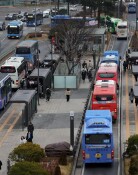Household Savings Decline, Stifling Biz Investment
Household Savings Decline, Stifling Biz Investment
Posted March. 03, 2010 09:17,
A so-called economic virtuous cycle in which households save extra money while businesses borrow the money for investment is at risk.
Households saddled with debt including mortgages have cut savings while businesses are piling up liquidity. The situation of Households save, businesses invest is now changing.
The Bank of Korea said yesterday that corporate savings at the end of last year was 215.8 trillion won (187.2 billion U.S. dollars), up a record 37.74 trillion won (32.73 billion dollars) or 21.3 percent from 177.34 trillion won (153.8 billion dollars) at the end of 2008.
In particular, the share of long-term savings of longer than a year in corporate savings rose to 85 percent, the highest level since 86 percent in 2003, when the credit card debt crisis hit the Korean economy. In other words, more businesses are opting to keep their funds in banks instead of investing.
Household savings, a traditional source of investment, have grown sluggishly. Household deposits were worth 360.53 trillion won (312.69 billion dollars) at the end of last year, up 10.4 percent from 326.62 trillion won (283.2 billion dollars) in 2008 or a little less than the 10.4-percent increase in 2008, and less than half of the increase in corporate savings.
A significant amount of household savings is just a transfer of money invested in stocks and funds to bank savings. So last years household savings ratio, or the ratio of money left over after spending to disposable income excluding taxes and interest, is assumed to have matched the historic low of 2.5 percent in 2008 or lower.
Households could not save more because incomes did not rise due to the sluggish economy last year, while debts increased dramatically. The average household income last year was 41.31 million won (35,830 dollars), up 1.5 percent from the year before. Household debt rose 5.1 percent to 43.37 million won (37,610 dollars), however.
Experts say if and when an exit strategy is carried out this year, it will lead to higher interest rates. This will in turn raise the debt burden of households and reduce their savings.
Yoo Byeong-gyu, economic research director at Hyundai Research Institute, said, If interest rates rise in an environment where employment-triggered household income does not rise, household savings and corporate investment will fall and this will dampen consumption a vicious cycle.
weappon@donga.com







